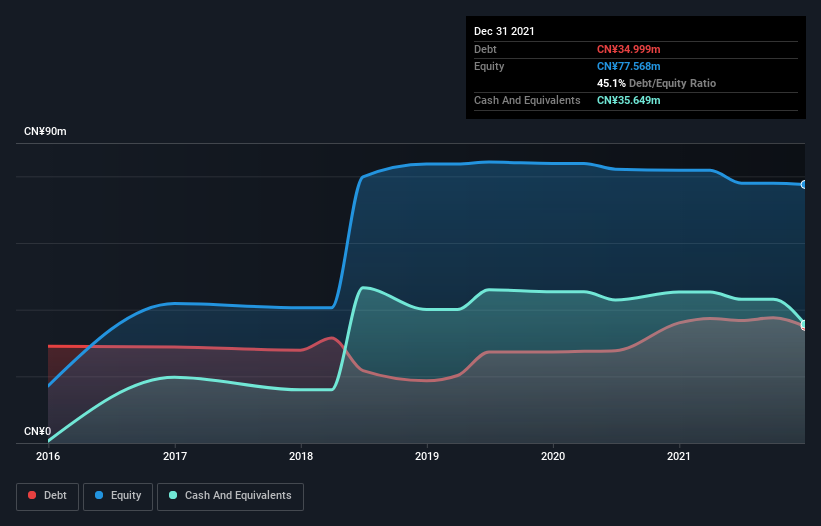
David Iben put it well when he said, 'Volatility is not a risk we care about. What we care about is avoiding the permanent loss of capital.' So it might be obvious that you need to consider debt, when you think about how risky any given stock is, because too much debt can sink a company. We can see that Bao Shen Holdings Limited (HKG:8151) does use debt in its business. But the more important question is: how much risk is that debt creating?
Why Does Debt Bring Risk?
Debt assists a business until the business has trouble paying it off, either with new capital or with free cash flow. Ultimately, if the company can't fulfill its legal obligations to repay debt, shareholders could walk away with nothing. However, a more usual (but still expensive) situation is where a company must dilute shareholders at a cheap share price simply to get debt under control. Having said that, the most common situation is where a company manages its debt reasonably well - and to its own advantage. The first thing to do when considering how much debt a business uses is to look at its cash and debt together.
View our latest analysis for Bao Shen Holdings
What Is Bao Shen Holdings's Net Debt?
The chart below, which you can click on for greater detail, shows that Bao Shen Holdings had CN¥35.0m in debt in December 2021; about the same as the year before. But on the other hand it also has CN¥35.6m in cash, leading to a CN¥650.0k net cash position.

How Strong Is Bao Shen Holdings' Balance Sheet?
According to the last reported balance sheet, Bao Shen Holdings had liabilities of CN¥71.4m due within 12 months, and liabilities of CN¥2.67m due beyond 12 months. Offsetting this, it had CN¥35.6m in cash and CN¥54.6m in receivables that were due within 12 months. So it actually has CN¥16.2m more liquid assets than total liabilities.
This luscious liquidity implies that Bao Shen Holdings' balance sheet is sturdy like a giant sequoia tree. On this view, lenders should feel as safe as the beloved of a black-belt karate master. Simply put, the fact that Bao Shen Holdings has more cash than debt is arguably a good indication that it can manage its debt safely. The balance sheet is clearly the area to focus on when you are analysing debt. But it is Bao Shen Holdings's earnings that will influence how the balance sheet holds up in the future. So when considering debt, it's definitely worth looking at the earnings trend. Click here for an interactive snapshot.
Over 12 months, Bao Shen Holdings reported revenue of CN¥137m, which is a gain of 13%, although it did not report any earnings before interest and tax. That rate of growth is a bit slow for our taste, but it takes all types to make a world.
So How Risky Is Bao Shen Holdings?
By their very nature companies that are losing money are more risky than those with a long history of profitability. And the fact is that over the last twelve months Bao Shen Holdings lost money at the earnings before interest and tax (EBIT) line. Indeed, in that time it burnt through CN¥8.2m of cash and made a loss of CN¥3.7m. Given it only has net cash of CN¥650.0k, the company may need to raise more capital if it doesn't reach break-even soon. Overall, its balance sheet doesn't seem overly risky, at the moment, but we're always cautious until we see the positive free cash flow. There's no doubt that we learn most about debt from the balance sheet. However, not all investment risk resides within the balance sheet - far from it. Be aware that Bao Shen Holdings is showing 3 warning signs in our investment analysis , and 2 of those make us uncomfortable...
At the end of the day, it's often better to focus on companies that are free from net debt. You can access our special list of such companies (all with a track record of profit growth). It's free.
Valuation is complex, but we're here to simplify it.
Discover if Bao Shen Holdings might be undervalued or overvalued with our detailed analysis, featuring fair value estimates, potential risks, dividends, insider trades, and its financial condition.
Access Free AnalysisHave feedback on this article? Concerned about the content? Get in touch with us directly. Alternatively, email editorial-team (at) simplywallst.com.
This article by Simply Wall St is general in nature. We provide commentary based on historical data and analyst forecasts only using an unbiased methodology and our articles are not intended to be financial advice. It does not constitute a recommendation to buy or sell any stock, and does not take account of your objectives, or your financial situation. We aim to bring you long-term focused analysis driven by fundamental data. Note that our analysis may not factor in the latest price-sensitive company announcements or qualitative material. Simply Wall St has no position in any stocks mentioned.
About SEHK:8151
Bao Shen Holdings
Bao Shen Holdings Limited engages in manufacturing and processing of plastic and steel components for white goods in the People’s Republic of China.
Adequate balance sheet and slightly overvalued.
Market Insights
Community Narratives




